Estimated reading time: 15 minutes
Brilliant weather, a low cost of living and friendly, English speaking people makes The Philippines a popular destination for British expats.
Numbers are not on par with Spain or Australia, but The Philippines still has a significant British contingent.
A couple on the UK State Pension of £18,000 a year have enough for a basic lifestyle. However, they miss out on cost-of-living increases, especially if they opt to live on one of the more remote paradise islands of palm-fringed white sand beaches and crystal clear tropical waters.
Table of contents
- About The Philippines
- Expats in The Philippines
- Moving to The Philippines
- Jobs and Salaries
- Philippines Visas
- Renewing UK Passports from The Philippines
- Cost of Living in The Philippines
- Renting and Buying a Property in The Philippines
- Healthcare in The Philippines
- Schooling and Further Education
- Driving in The Philippines
- Money, Tax, and Pensions in Philippines
- Inheritance Tax, Wills, and Estate Planning
- How Financial Firms Are Regulated in The Philippines
- FATCA and CRS
- Voting in The Philippines
- Social Ethics and Traditions
- Living In The Philippines FAQs
- Related Information
About The Philippines
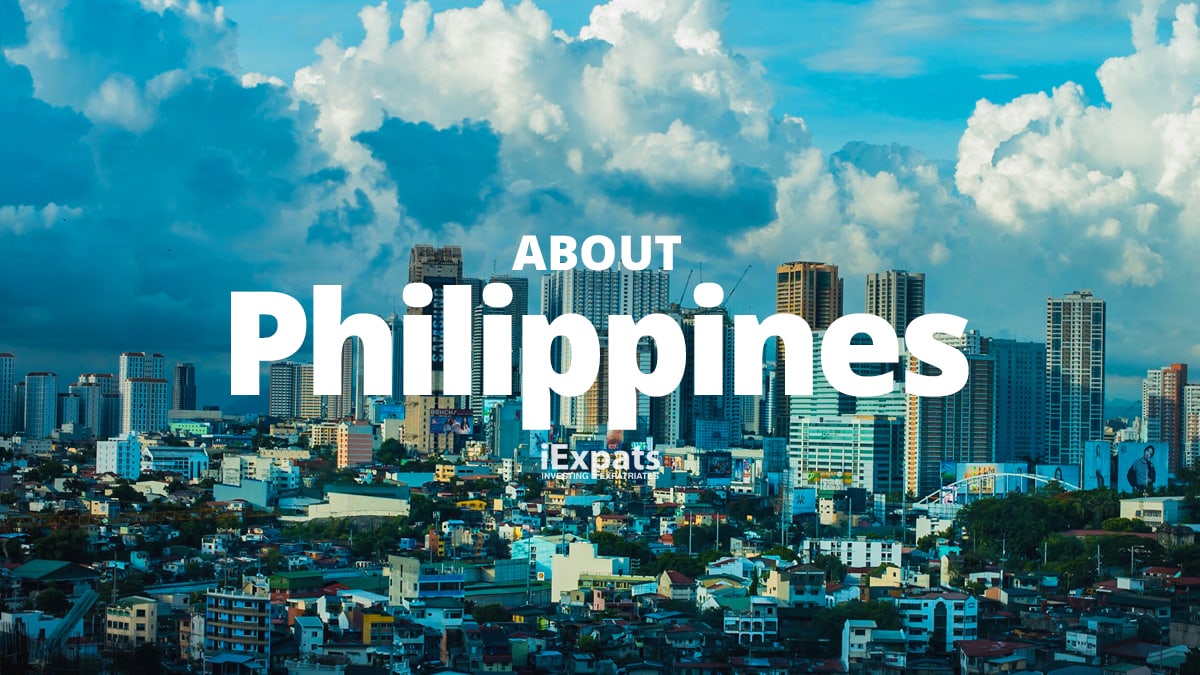
The Philippines is a country of contrasts. You can probably find anything you are looking for, from bustling, crowded cities to the solitude of pristine, deserted beaches.
The country is a sprawling group of more than 7,500 islands in the Asia Pacific not far above the equator, sitting between Taiwan, a few hundred miles to the north, and Borneo, a similar distance to the southwest.
Philippines Facts and Figures
With a population of 110 million, The Philippines is the 13th most populous country in the world. The population is evenly split among urban dwellers and those living in the country.
The capital is Manila, a sprawling metropolis which is home to 13 million people. Manila is the most densely populated city in the world with almost 43,000 people per square mile.
Other large Metros are Cebu, population 3 million and Davao with a population 2.5 million.
Religion
The Philippines allows the worship of many religions, with Catholicism practised by 80% of the population.
However, Christians, Muslims, and Buddhists live side-by-side in most communities.
Language
Filipinos speak nearly 200 different languages. The most popular is Tagalog, spoken by one in four with Cebuano ranking next with one in five speakers.
Climate
The Philippines enjoys a tropical climate with hot, dry weather for most of the year.
The monsoon season lasts from June to November.
The average daily temperature hovers around 80 Fahrenheit or 26 Centigrade all year.
The islands suffer from extreme weather and natural conditions, including cyclones and earthquakes.
Economy
The Philippines has a growing and sophisticated economy based on technology, clothing, and agriculture.
Many Filipinos work overseas and remit money home to their families.
The Philippines is one of the world’s leading internet users and has a booming smartphone market handling more than a billion local text messages daily.
Expats in The Philippines

Half The Philippines population lives on the island of Luzon – where the capital Manila is also sited.
10,000+ British expats living in The Philippines
Around 10,000 British expats are thought to live on the islands, according to government research in 2011.
Where Expats Live in The Philippines
Where British expats live in The Philippines depends on where they are in their lives.
Younger expats who moved to the country on assignment for an employer are more likely to live in a city, while retired expats tend to be drawn to the beaches on more remote islands.
Moving to The Philippines
Once you have made your mind up to leave the UK for good and move to The Philippines, you must complete some priority formalities to make the move official.
- Give your local council your address in The Philippines
- Stop or arrange to have state benefits paid in The Philippines
- Speak to the International Pension Centre about claiming or receiving the state pension
- Tell HM Revenue & Customs (HMRC) about your move. File a Form P85 to tidy up your tax affairs and file a P45 from your last employer, if you have one
- On applying for your Philippines visa, make sure you get an ACR i-Card. This is an ID card that allows you to pass through immigration controls.
- If you are working in The Philippines, you will also need an Alien Employment Permit (AEP)
The ACR i-Card and AEP are both issued by The Philippines consulate and embassy in the UK
Jobs and Salaries
The Philippines has a fast-accelerating economy, but low pay by Western standards.
The average Filipino family earns 313,000 pesos a year – about £5,050.
Well paid jobs attract a salary of around £16,500 a year, but the cost of living is cheap.
Philippines Visas
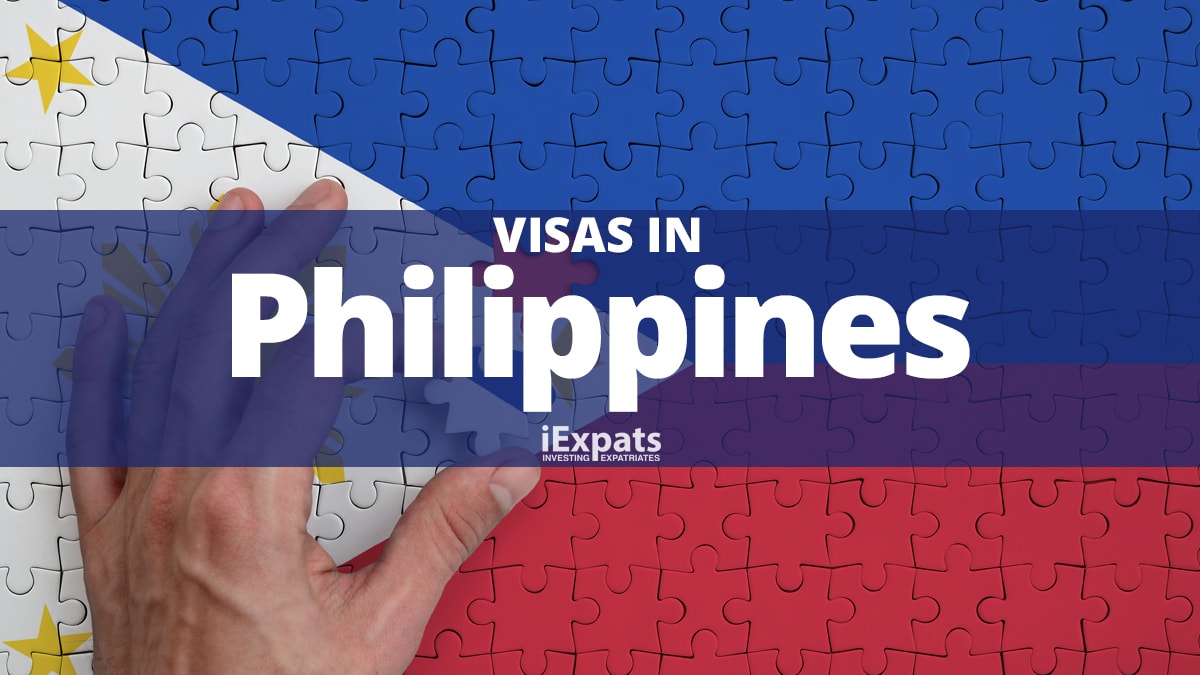
British tourists and expats can stay in The Philippines for up to 30 days without a visa if they have valid tickets to leave the country. A passport must be valid for at least 6 months beyond the end date of the stay.
For longer stays, expat birth certificates, the UK Philippines Embassy must authenticate marriage certificates and school records.
The authorities in The Philippines will ask for these documents if an expat applies for a long-term resident visa.
Depending on your immigration status and length of stay, several visa options are available:
Non-Immigrant Visa
A non-immigrant visa for a pre-arranged job or going to the Philippines to study
Quota Immigrant visas
Quota immigrant visas are golden visas for wealthy expats investing to benefit the country. Only 50 quota immigrant visas are issued each year.
Special Resident Retiree Visa
A special resident retiree visa is a non-immigrant visa that allows expats to leave and return to the country when they want an indefinite stay.
The visa comes with some financial terms:
Renewing UK Passports from The Philippines
You can renew a British passport from the Philippines. Learn how to manage your British passport as an expat here.
A passport should for at least six months from the date of entering The Philippines.
Cost of Living in The Philippines
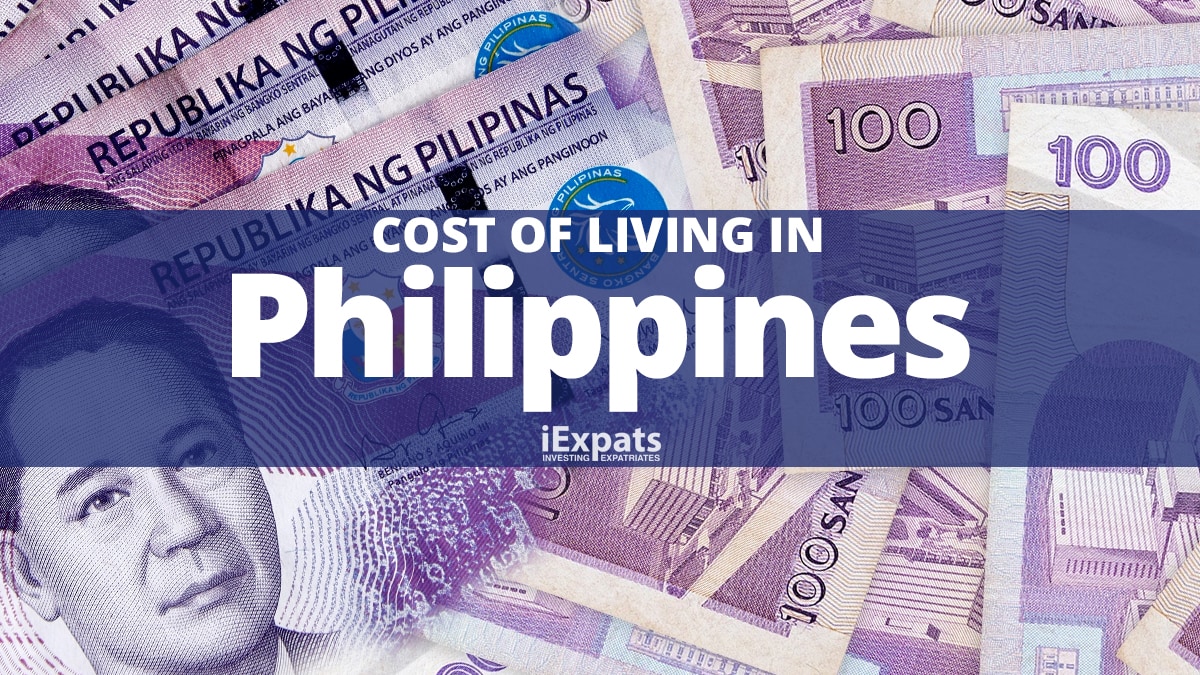
The cost of living is inexpensive in The Philippines compared to most Western countries, making the islands a favoured destination for expats.
Many stop over between contracts in the oil and gas industry.
A three-course meal in a mid-range restaurant for a couple costs £13 and even a swanky, upmarket restaurant dinner for two comes with a bill of £35. A McDonald’s meal is priced at £2.45.
British expats will find that the living costs in The Philippines are low And a higher quality of life can be obtained
Renting a three-bedroom apartment in a city centre will set expats back £257 a month, plus utilities including broadband and a mobile costing around £160 a month.
Rents and utilities drop for expats living outside of a city.
Petrol costs £0.83p a litre, while a VW Golf or equivalent new car is around £21,000.
Getting around in towns and cities is easy by hailing a cheap Jeepney – a colourful highly decorated taxi.
Cost of Living in the Philippines Compared to the UK
- Consumer Prices in Philippines are 40.54% lower
- Consumer Prices Including Rent in Philippines are 47.57% lower
- Rent Prices in Philippines are 64.76% lower
- Restaurant Prices in Philippines are 70.15% lower
- Groceries Prices in Philippines are 30.38% lower
- Local Purchasing Power in Philippines is 74.75% lower
Renting and Buying a Property in The Philippines
Buying a property abroad or buying land in the Philippines is not easy for expats. Complicated and long-running disputes over titles and ownership arise regularly, especially where westerners are concerned. Anyone wanting to buy property should take legal advice from an independent professional.
The UK embassy in Manila publishes a list of English-speaking lawyers.
Healthcare in The Philippines

Healthcare is patchy in The Philippines and sometimes falls far below the standards expected in the UK.
Better care is available in cities, but in remoter areas, adequate facilities may be some distance away with transport limited to boat or helicopter. Even then, the hospital may offer limited emergency cover.
Private healthcare is expensive, with the cost of intensive care running at more than £1,000 a day.
Its essential expats have adequate private health insurance to cover their needs and those of their families.
The policy should offer:
- Repatriation to the UK if you need to come home for treatment
- Cover for the full cost of treatment
- Repatriation if you die in The Philippines
- Payment to bring your family home if you are ill or injured
Health Insurance for Expats
Private medical cover is not mandatory for expats in The Philippines.
The health system is a mix of public and private hospitals which generally require payment up front.
PhilHealth, the state medical insurance scheme, has basic packages for expats.
Private cover will offer more features and benefits.
Health insurance costs between £40 a year for the cheapest cover to £160 a year for a policy with more benefits.
Taking Medication into The Philippines
Expats taking medicines into the Philippines must show lawful possession with their prescription from your doctor or hospital.
Schooling and Further Education
The Philippines is well served by international private schools for expat children of all ages.
Many of the schools are clustered around Manila.
Fees range from £10,000 a year for Elementary School to £13,500 a year for High School grades 11 and 12.
Other costs include uniforms, books, sports equipment, and other incidentals.
The annual schooling fee does not include boarding.
The Philippines has some excellent universities rated among the best in the Asia Pacific, but the costs are well out of the range of ordinary working families.
Fees start from £3,000 a year, rising to £3,850 a year, depending on the college and course.
Driving in The Philippines
You need to have a local driving licence to drive in the Philippines or apply for an international driving licence from the Philippines’ Land Transportation Office (LTO).
Applying for a Driving Licence
To tick the boxes needed to apply for a Philippines driving licence, expats must:
Examiners will ask expats to sit a brief written driving test and to pass a drugs test.
Car Insurance
Driving in The Philippines can be frantic to an expat as drivers tend to ignore the rules of the road and traffic lights.
Car insurance is mandatory, and a local policy is considered better than international cover that may not offer all the features needed in The Philippines.
Money, Tax, and Pensions in Philippines
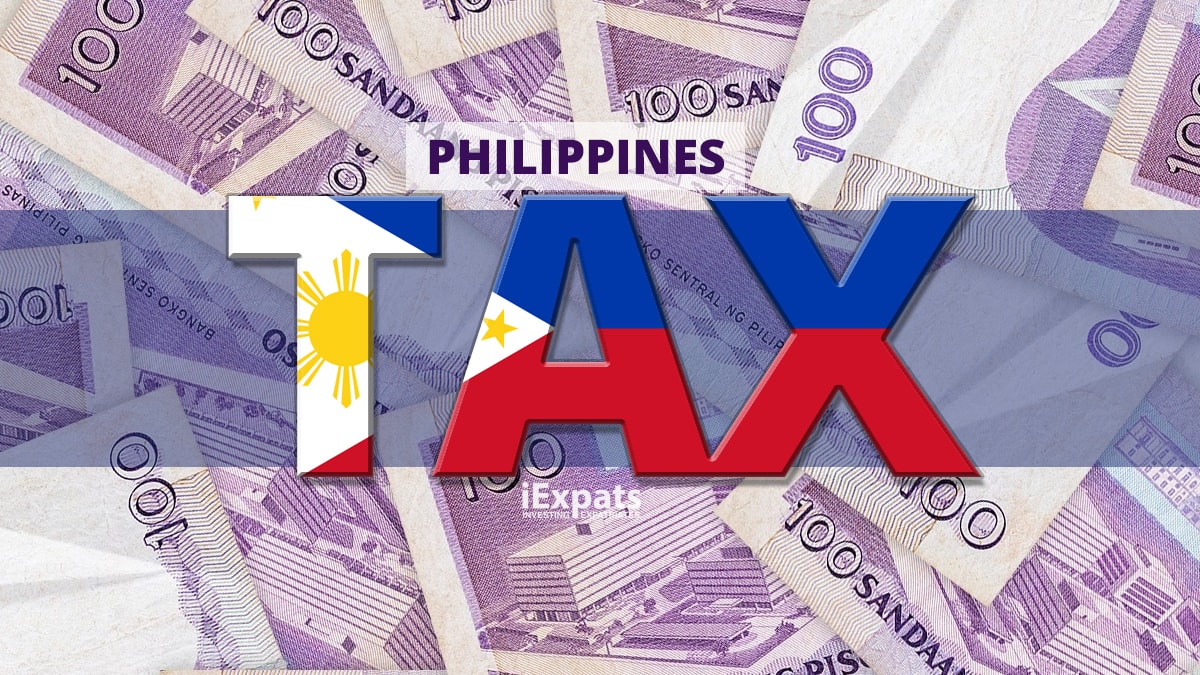
The currency of the Philippines is the Philippine peso (PHP).
The exchange rate with Sterling varies and is currently around 62 pesos to the Pound.
Expats can bring up to 50,000 pesos (£800) into The Philippines without prior permission. For higher amounts, the Philippines Central Bank must give written agreement.
Inflation is running between 1.75% and 2.5% without considering the impact of the coronavirus pandemic.
Paying Tax in The Philippines
Pensions and other earnings are subject to personal income tax.
The highest rate is 35% on incomes of over £128,000, with the basic rate starting at 20% on income of 250,000 pesos (£4,031).
Other rates are charged for capital gains, passive investment income and benefits paid by employers.
Cash, Credit, and Debit Cards
Many ATMs do not accept international credit or debit cards.
Larger shops generally accept foreign credit cards but not debit cards or traveller’s cheques.
Outside major cities shop with cash as ATMs and exchange bureaux are scarce.
Benefits
There are no Social Security payments in the Philippines for expats.
Drawing a UK Pension in The Philippines
This table outlines if your pension rises in line with UK inflation and pays a guaranteed income while you live in The Philippines.
| Pension | Type | Index-linked? | Income guarantee? | Currency | Paid to local bank? |
|---|---|---|---|---|---|
| UK State Pension | – | No | Yes | £ | Yes |
| Public sector | – | Yes | Yes | £ | Yes |
| Civil Service | – | Yes | Yes | £ | Yes |
| Workplace | Defined benefit (DB) | Yes | Yes | £ | Yes |
| Workplace | Defined contribution (DC) | No | No | £ | Yes |
| Personal | Defined benefit (DB) | Yes | Yes | £ | Yes |
| Personal | Defined contribution (DC) | No | No | £ | Yes |
| QROPS | Defined contribution (DC) | No | No | Any major currency | Yes |
Expats should check the terms and conditions of their own pensions to confirm how their provider pays in The Philippines.
In The Philippines, the British state pension is frozen at the amount of the first payment for life – effectively removing the index-linking retirees receive in the UK. The maximum first payment is 10,875 pesos or £175.20 weekly (565,575 pesos/£9,110 a year).
Expats in The Philippines cannot start a non-workplace QROPS without paying the Overseas Transfer Charge. The Philippines does not have any QROPS providers, and joining a scheme outside your country comes with a tax penalty.
The charge is 25% of the amount transferred into the QROPS.
Find out more about QROPS.
Some workplace and international organisations QROPS are exempt from the OTS.
UK ‘trivial commutation’ rules still apply in The Philippines even if you only have one or more small funds worth less than £30,000 in total.
The rules mean you need to take advice from a suitably qualified IFA or free guidance from the UK government’s Pension Advisory Service
Can I Top Up or Defer my State Pension in The Philippines?
Expats can make voluntary contributions in The Philippines to top up a State Pension entitlement. They can also defer drawing the State Pension.
Find Your Lost UK Pension
According to the latest research, around 1.6 million savers need to find their lost pensions worth £19.4 billion. Learn how to find your lost UK pension.
Inheritance Tax, Wills, and Estate Planning
Many expats have real estate, investments and bank accounts in The UK and The Philippines, which can pose a problem on their death.
When they die, local laws in each country determine how assets are distributed according to a valid will or succession laws.
In The Philippines, a civil code decides how wealth is divided within a family in the absence of a will, while the UK rules are based on common law.
Expats with significant wealth should make a will detailing their final wishes in each country where they hold assets. Learn about what’s needed for a legal expat Will.
To complicate matters more, The Philippines has no wealth or inheritance taxes, but the UK does.
The conflicting legal and tax systems mean expats should take professional estate planning advice in both countries.
How Financial Firms Are Regulated in The Philippines
Taking financial advice in the Philippines needs careful thought and understanding before you decide what company to use.
A financial adviser should at least qualify as a Registered Financial Planner (RFP) of the trade body RFP Philippines, which offers a certification program and a professional code of ethics that members should follow.
Most expat advice firms in The Philippines are regulated in the UK
FATCA and CRS
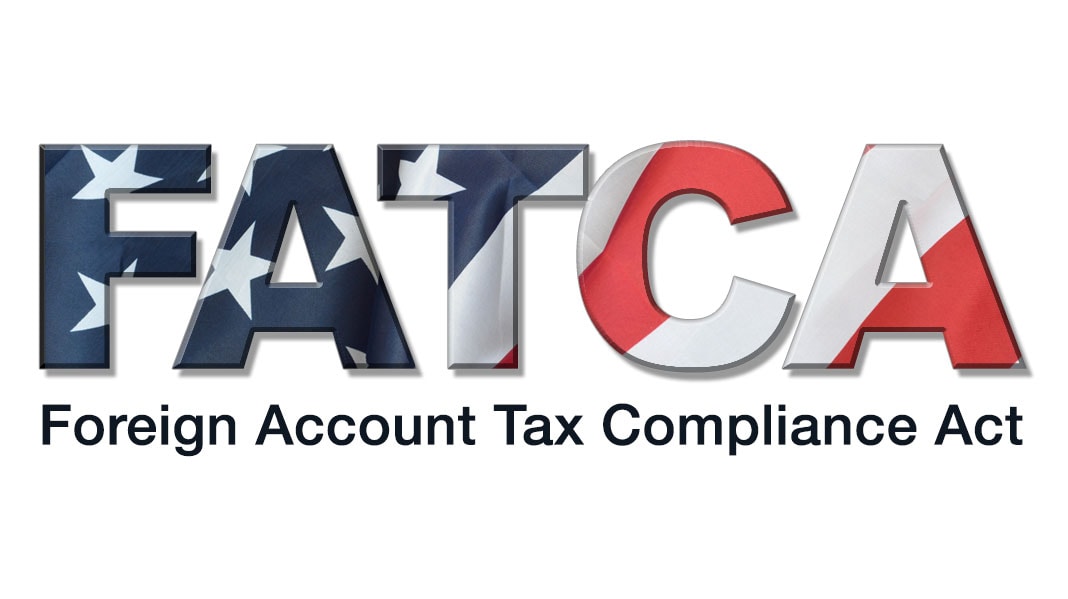
FATCA, the US Foreign Account Tax Compliance Act, and CRS, the Common Reporting Standard, aim to ensure any tax resident of countries in the networks cannot keep money or other assets hidden offshore.
FATCA is a US program that includes banks and finance houses in The Philippines.
Any FATCA-registered financial institution feeds data on accounts held by US nationals to the Internal Revenue Service (IRS), and in many cases, the IRS reciprocates with information about Philippine residents with accounts and investments in America.
CRS is a similar network to FATCA comprising of more than 100 countries, but The Philippines is not yet a member state and is not listed to join before 2021 at the earliest.
Voting in The Philippines
Expats can still vote in the UK once they have retired to The Philippines.
Expats can vote from overseas in UK General Elections and Bye-Elections in the constituency where they last lived.
Currently, the 15-year rule restricts voting. The law allows expats to vote in elections for 15 years after leaving the UK.
The government has announced scrapping this rule, but no date is set for repealing the law.
Social Ethics and Traditions

It is easy for British expats to get along in The Philippines as English is widely spoken.
As a Catholic country, much of the culture and customs are familiar to Westerners.
However, there a few points to bear in mind when in The Philippines:
Do not Duck a Beso
Beso is Spanish for ‘kiss’ and means touching cheeks as a greeting in The Philippines.
It is a male/female greeting and never man to man.
Turning down a beso is considered rude.
LGBT and Same-Sex Couples
The Philippines is generally tolerant towards the LGBT community. The law does not recognise same-sex couples in the same way as the UK. Public displays of affection could be interpreted as an offence by police.
Boxing and Basketball
Filipinos are mad about boxing and basketball and millions tune in to their TVs and the streets are deserted when local hero Manny Pacquiao fights.
Coconuts are Big Business
The Philippines ships 20 million tons of coconuts overseas every year and is the world’s biggest producer of the fruit.
Filipinos Cannot Say No
Politeness is considered a virtue and often avoid saying no and go for a more complicated and obtuse response that can be confusing
Living In The Philippines FAQs
We’ve collected a bunch of frequently asked questions about living in the Philippines.
The time in the Philippines is 7 hours ahead of the UK.
The Philippines comprises more than 7,500 islands, only 2,000 are inhabited, and 5,000 are unnamed.
The Philippines islands are in the Asia-Pacific (APAC) region or Southeast Asia. Not far above the equator, sitting between Taiwan, a few hundred miles to the north, and Borneo, a similar distance to the southwest.
Tagalog, which is now usually referred to as just Filipino, and English are the official languages in the Philippines
A financial adviser at a minimum should qualify as a Registered Financial Planner (RFP) of the trade body RFP Philippines, to give financial advice in the Philippines.
Related Information
Below is a list of related articles you may find of interest.

I think some of your facts are incorrect e.g. The UK has agreements with some other countries to protect the social security rights of workers moving between the 2 countries.These are sometimes known as ‘bilateral agreements’ or ‘reciprocal agreements’.
If you live in of the Philippines and receive a UK State Pension, you will usually get an increase in your pension every year:
Also there is a duel taxation agreement between the UK and the Philippines e.g. draw your pension in the UK and elect to get taxed in the UK or the Philippines. The Philippines does not tax income from abroad.
That is my understanding also. I don’t personally know anyone claiming uk state pension there who can verify it but the UK government pension website definitely lists the Philippines as a country where pension increments are paid.
UK Pensions can be accessed in Philippines, but as stated once the first ‘draw down’ takes place, that will be the amount received ad-infinitum (no rise each year as there would be in UK).
Conversely, State pensions from Australia cannot be paid abroad.
I’m afraid you are incorrect, the previous comments are correct. Check the gov.uk website and you will see for yourself. Any rises in the UK state pension will still be paid if you live in the Philippines.
this fact you stated is not correct: “The average Filipino family earns 313,000 pesos a year – about £5,050.” This figure is way to high in almost all areas except Manila. I know many families there that are only making between 8,000 and 15000 pesos per month and most on the lower end so your figures are not accurate.
Agreed, domestic workers in Manila can expect perhaps 7-8k pesos per month. Out in the provinces it’s less again. Most do get a 13th month salary at the end of each year as a form of annual bonus.
Unskilled Labourers in the provinces are paid on average 3-400pesos a day
Aside from an employment visa, the Philippine government requires non-resident foreign nationals to apply for an Alien Employment Permit (AEP) if they plan on working in the Philippines. The department responsible for this permit is the Department of Labor and Employment (DOLE).
True, however, if successfully applying for SRRV visa, no Alien Registration Card is required, is a permanent multiple entry visa and costs a yearly fee to renew. It does, however, have other financial requirements attached to it (bond, property deed, investment) etc
I’m curious, can I operate a business with a non quota permanent residence Visa?
Can a British male living in Philippines currently travel to the uk without giving an address,
that they intended to stay in the uk while here? ( covid rules)
Where to start, have you even been to the PH? One certainly wonders. Having lived here 2 years and experienced travel in all the provinces, I can say hardly anyone can speak english. Yes they can say hi and”hey joe” but thats primarily it. If they haven’t had a private school education forget it.
Get on a bus or a ferry and talk to staff, you’re on your own.
Lets talk about friendliness. Sure filipinos are pretty friendly, until you disagree. Then its 50/50 & they kill you.
N. Cotabato, don’t even go there, too dangerous. Squatter areas, you go in you don’t come out. Muslim areas the same, unless you’re muslim.
Tourists must stay to tourist areas, never go out alone at night. Is this sou ding like the article?
80% catholic and 99% are fakers, its a joke really. People are so superstitous you would think you’re in africa.
Enviornmentalist? Stay home, PH is #1 in the world for murdering you. Paedophile? Welcome to the PH, #1 live streaming child pornography. Great catholics right??
How this country doesn’t have divorce is monumentally idiotic. Dead beat Dads?probably #1 in that too.
You can fluff up the PH all you want. Is it beautiful with nice beaches? Yes, is it safe? No.
Are girls honest and pure like good catholics should be (according to catholics) ? Hell no. Scam capital of Asia.
If your North American stick with Mexico and the Caribean, European stick to Europe. The PH is cheap but it has a lot of issues. Think of it as living in the 1800s
a bit biased, you must have a black cloud following you around, ive been to PH several times, never found ANYTHING like your experience or speciation! the most threatening thing i found was from their women trying to entice you to be with them! ( ok you might read that as they are trying to lure you into….)
I’m not sure what you’re still doing there but it sounds like it’s time to start packing. One would assume that you did your research prior to moving(?) Filipinos are nice to people who are nice and respectful to them. The most threat we had experienced were mosquitoes. Manila is not a place you would wonder on your own at night but that goes for many tourist places. As for the “girls”, again it makes a person question as to where and who you were hanging around with.
I’ve walked around Manila at night with no issues, although at 100kg you tend to dwarf most locals and with those odds they tend not to try, unless your stupid and go into poor areas full of bling and cash you’ll be fine. I’ve trained there (Filipino stick fighting) and had a few Filipino girlfriends including current partner and no issues! Yes some scammers but then many westerners who lie to get a lay in holiday ‘romance’ then disappear so some is karma..
Though I’ll agree it’s different to the west I feel you’re being ignorant. I’m half filipino half English and I can tell you a lot of Filipinos speak English very well, especially that work in transport like boats.
There are many eco friendly places and I’d say it’s much better than the west on that front. No ridiculous manufacturing processes for everything. If it’s true you’ve traveled the provinces you would know that most people do not live with lavish items. Often people eat from bamboo leaves-no fossil fuel émission I’m those unlike making a plate or Styrofoam. Houses in provinces don’t have insulation that release asbestos. Filipinos are very self-sufficient and farm much of their own food-less food miles/ CO2 émission. I could go on…
Next paedophiles get the death sentence…
Most westerners have the money to retire to safer areas I. E. Boracay, Palawan etc and are not crazy enough to move to Muslim areas in provinces if they’re worried about their safety.
Filipinos are ranked the friendliest people in the world, they put others first and are always willing to help. They will only get seriously angry if you’re disrespecting them or our culture.
Kaya – that’s a good post. I’ve spent about 3/4 years there on and off in the 1980s and 90s in Luzon and the Visayas. I tried to learn some Visayan but most if not all spoke good English so I couldn’t!
Also not mentioned here is the musicianship – wonderful singers and instrument players. Mosquitoes and pollution were the main problems for me.
Poor JR… reckon you got scammed by the street wise girls you thought you could take advantage of 😂😂
The Philippines is an amazing country with amazing people but just like anywhere else in the world it has no go areas, bad people and scammers.
It is a very poor third world country so expect to see a poor third world country if you visit, as well as the tropical paradise.
The poverty and waste pollution is shocking to see as a westerner and the government and local councils (or whatever the equivalent is) need to up their game and sort it out, but unfortunately, corruption rules.
I think you need to move back to where you came from. I’ve been travelling back and forth (pre pandemic) from London to Metro Manila for approx 5 years and have never had any trouble. My partner moved back to Cainta just before the UK lockdown, to keep an eye on her family (parents and bros/sis in laws, nephews and nieces). Everyone i’ve met when i’m there speaks English (even the kids), okay my partner and her brothers are all university educated and the sis in laws all work in Government. When i’ve travelled with her back to the Provinces to see her parents, Duamagete, again, never any trouble, just loving, friendly people. I will also look to settle out there, as i’m very fortunate to be able to take early ‘retirement’ aged 46 years! Life’s for living and i intend to do just that in the Philippines.
If you go to PH with that kind of attitude, then don’t expect people to treat you with respect. No place in the world would treat you good when you acted like that. It’s that bad that it had been 2 years and you’re still living there? Dude, pack your shit and go! You probably go to the deepest country where education is not as good unlike in a big cities. To be honest, you sound like a freaking expat going to the provinces of Philippines so you can buy you a bride. You come to a country that you said it doesn’t speak your language? Shame on you for not speaking theirs! Don’t come to that country expecting them to speak and acted like you! It’s their country, not yours! Go back to where you from!
nicknick1963
The deadbeat dad’s are the ones that stay at home to look after the kids while the wives do the menial jobs abroad in order to send money home.Really mate,everywhere here they speak English,friendly,helpful(I recently got a tow from lads when I broke down- in my boat,5 miles from shore! ) They were very happy with the p500(8 quid?) and half packet of fags I gave them.Oh, and they spoke English too.I have walked the streets of Sampaloc, manila,at midnight,and all I get is hey Joe,come drink with us,and at 5 in the morning its hey Joe,do you want some breakfast. There are problems in the country,but the vast majority of the population ain’t one of them
looks like you’d not recommend someone in their early 70s moving there to find a much younger wife !
I think you must be a very unlikable person. You should have taken the hint by now just as you explained nobody speaks English to you?? My guess is they just don’t want to! Why are you still there after 2 years? Your more than welcome to leave and one more thing…. you are in THEIR country, just the way they like it
I’ve been travelling to Naga city for the last 7 years, 2 or 3 times a year , and every where I go they speak English . Super friendly people, I broke down on my motor bike, soon I was joined by several locals all trying to help , and 1 gave me a lift to the city, about 10 km out of his way. My expat friends have had similar experiences. If you smile and speak slower than you would normally then you get a bigger smile back and the local does not get ( what they call) a nose bleed and will be happy to talk. I love the Philippines and the people ,treat everyone with respect and you will see how friendly they can be
I draw a UK state pension and live in the Philippines and my pension increases every year. There is an agreement between the UK and the Philippines on this.
My uk pension goes straight into my uk bank account… am i loosing out? Should I tell the uk govt, …what happens then?
OK, I am a retired musician and I have 21 guitars…Just collected them over the years I am selling 16 of them but I want to bring 5 of them. I’m not shipping household stuff as I don’t have much and I don’t want to pay a gazillion dollars for stuff I don’t really need. I married my wife in Cebu last October and I have an SRRV visa. I checked on line and it’s hella confusing on how to ship a guitar…most websites say I need a receipt, but these guitars are used, not worth too much and I don’t have the $@^&&#%&@ receipts anymore. I know I can bring a couple as extra baggage on the plane, but that leaves 3. Does anyone know a shipping service I could use so I don’t pay $500 dollars to ship a $300.00 dollar guitar. These 5 guitars hold sentimental, not monetary value, except the fact that an Ibanez guitar is very expensive in the Phils even though it’s manufactured in Japan (not that far away). Anyway, anyone who has some advice please let me know. Thanks in advance!
Try sending it using Balikbayan box. Just google it and there’s few Filipino shops that provide Filipino box service but it will take 6-8 weeks lead time for delivery at your address in the Philippines. Extra Large box should cost approx £150? Maybe your 3 guitars would fit in? No weight limit on balikbayan box. I hope this will help you. Have a safe journey & successful life in the Philippines.
nicknick1963
Yes,send it balikbayan box,weight no issue,so make wooden crate. I have sent many,and one included an electric cement mixer.most I ever paid from UK was 300 quid and I ram mine to the max.
I have lived in the Phils. For 14 years . I found out very quickly that you must do things the Filipino way IT IS THEIR COUNTRY DO THINGS THEIR WAY.. Or go back to where you came from. If you live in the countryside the cost of living is a lot less than than say, Manila or Cebu. My income is 23.500 pesos per month ( about 75 pounds per week) and as my home is paid for, I do not drive a car, have no debts life is o.k. and my neighbours are helpful and friendly
Hi Mr. Stevens
Moving to the countryside in the Philippines.
What could I get for around £40,000 please ?
Regards,
Steve
It was a few years ago but I built a two story 220m2 house for £42,000, it would have been quite a bit cheaper if I had been here to manage it but I had to do a lump sum contract. Quality – structure good, electric not so good, plumbing a design disaster so I replaced after a couple of years, drainage good and they struggled with the modern technology of a spirit level.
I’m confused.
Hi state pension is on U K govt list as index linked,but you show it as frozen @ 1st payment??